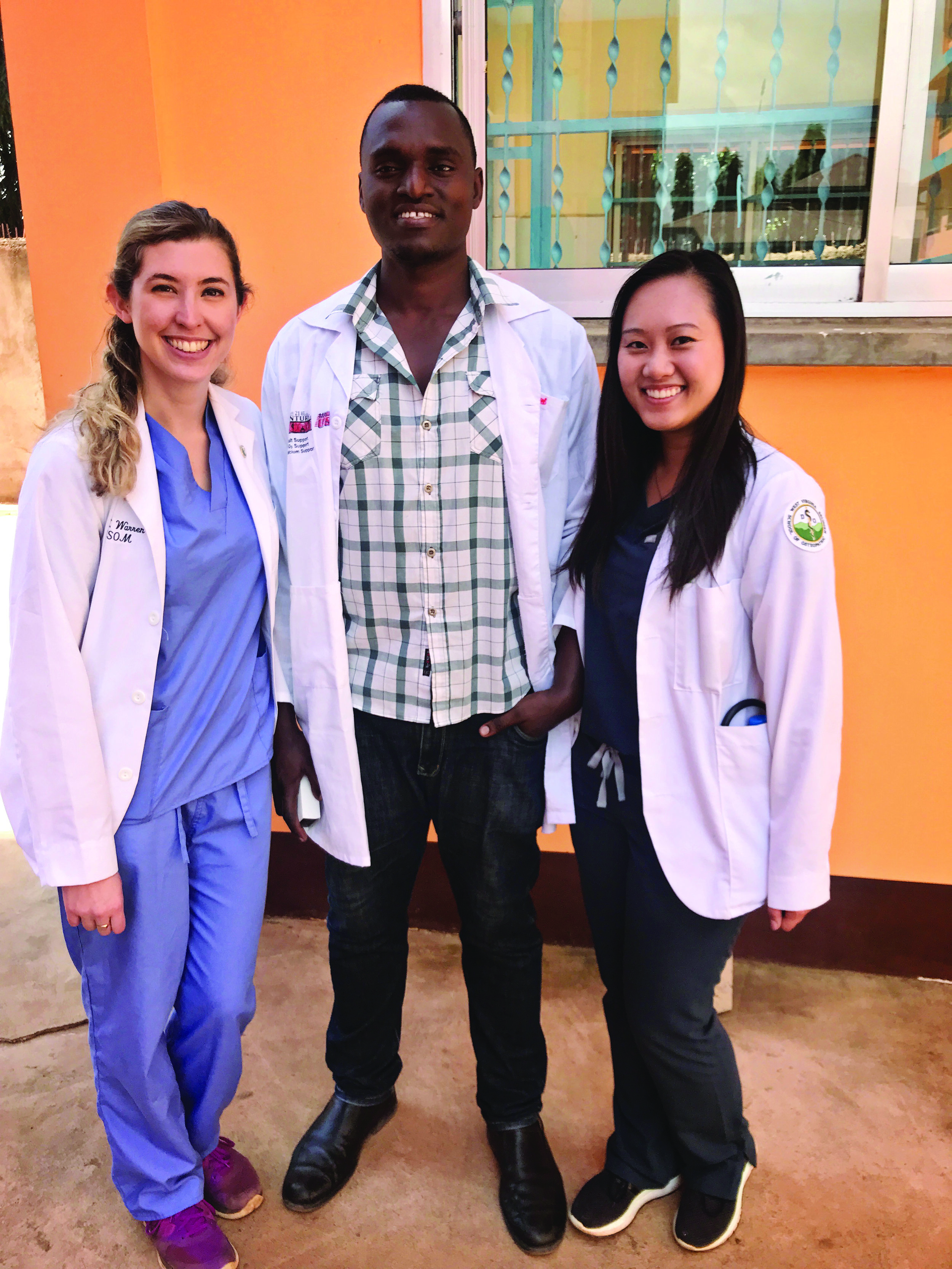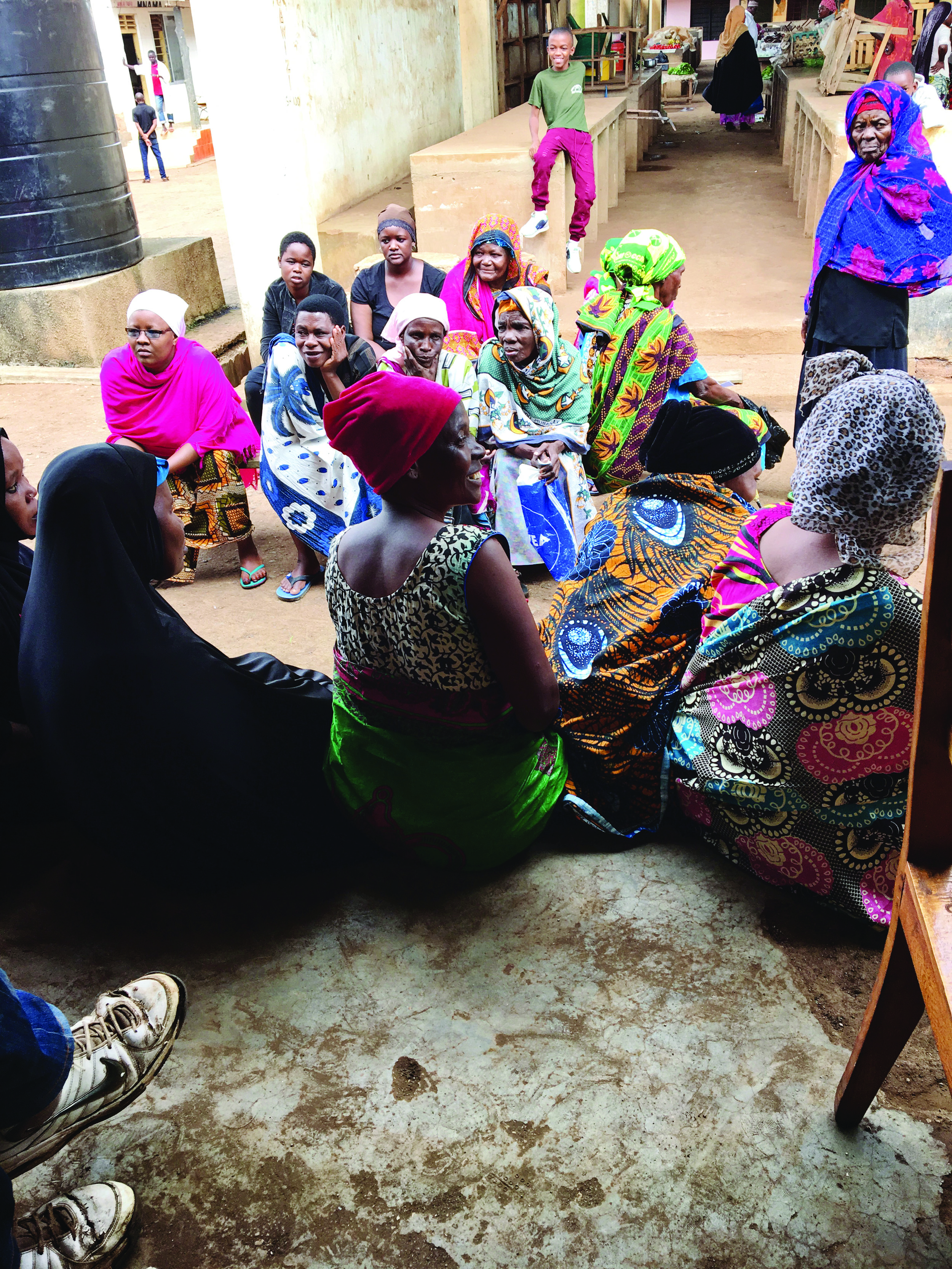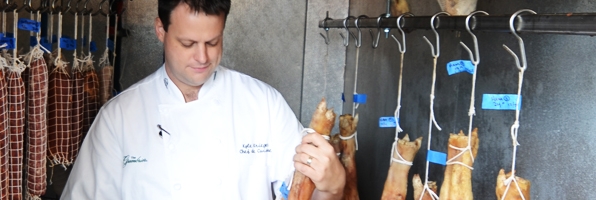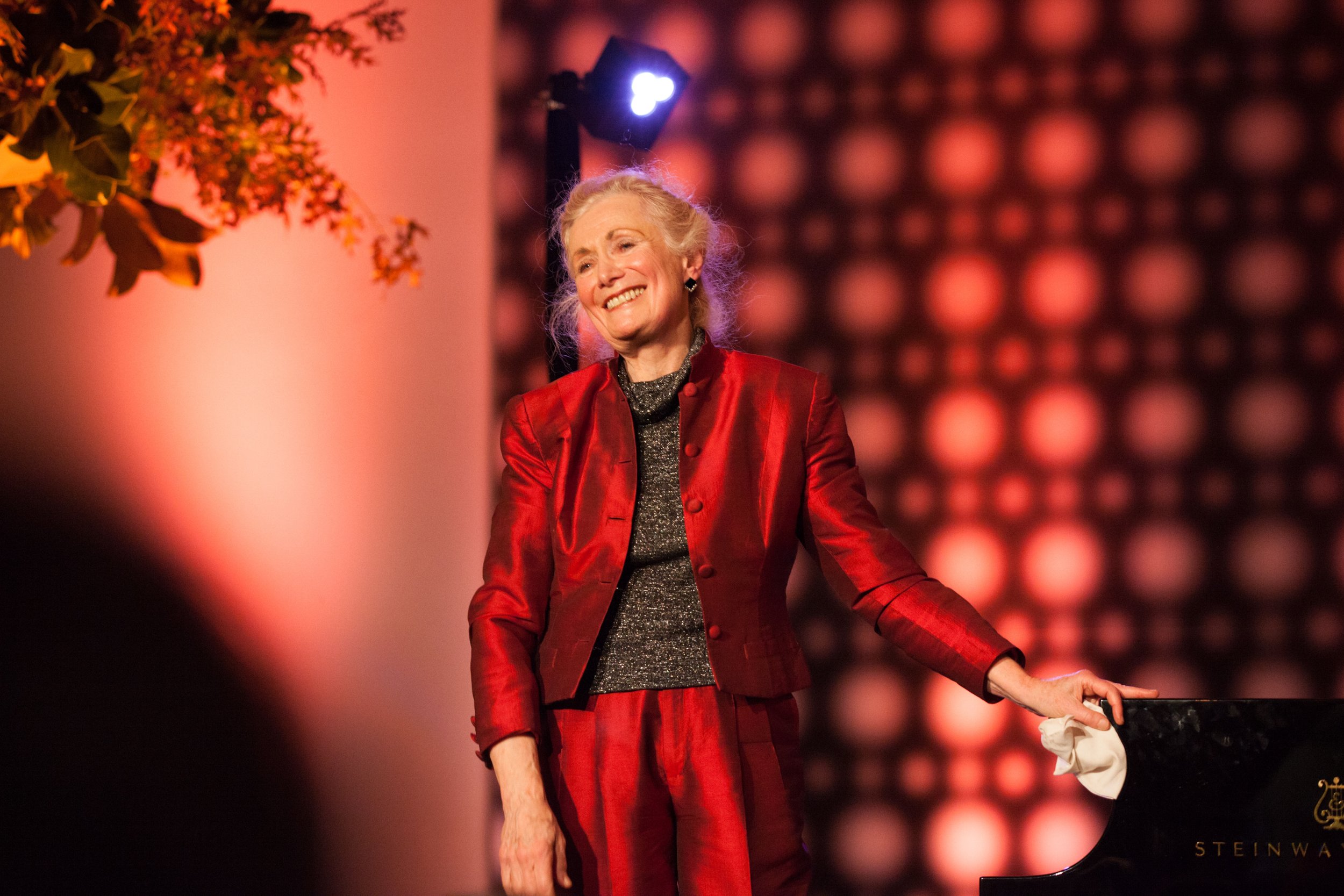Global Health, Global Reach

By Sarah Elkins
The city of Moshi, Tanzania is situated in the shadows of Mount Kilimanjaro in East Africa. Here, the continent’s tallest peak looms ever-present and snow-capped in the distance. In summer 2018, Moshi became home base for four second-year students from the West Virginia School of Osteopathic Medicine for three weeks while they participated in a medical internship through St. Joseph Hospital in Moshi. By their own accounts, it was an important and pivotal lesson in global health.
Adrienne Biesemeyer, the director of the Center for International Medicine and Cultural Concerns at WVSOM, coordinated the service trip with the assistance of Projects Abroad, an organization that builds volunteer projects of all sorts all over the world.
Emily Watson, Kate Warren, and Vivian To with village children.
Yet, this trip was nearly the trip that never was. Originally, 20 students signed up to go to the metropolitan oceanfront city of Cape Town, South Africa. But, severe drought conditions in the popular tourist destination prevented travel, and Biesemeyer had to act fast to find an alternate. Moshi, Tanzania it was. Culturally speaking, going from Cape Town to Moshi is the difference between New York City and Lewisburg. The trip roster dwindled to four registrants. Granted a change in dates accounted for some drop off, but, for many, heading to the wilds of Africa was suddenly a less enticing proposition.
Kate Warren, one of the students who hung in, admits she was apprehensive about the change in itinerary. She had been excited about seeing Cape Town, but Tanzania was a complete unknown. Now, she says, “I can’t imagine not having gone to Tanzania. I fell in love with it.”
“Tanzania is just remote. It’s a different part of Africa,” Janice Cooley, a consultant who also made the trip, says. “It was much, much better for the students to really get a taste of true Africa and the conditions that people live in.”
Cooley adds, “Global health is extremely important for all medical students to learn. These students had an opportunity to do that in Tanzania, understanding health issues from the standpoint of different cultures, and understanding disparities in health care and the causes of those disparities.”
Cooley, Biesemeyer and Drema Mace, Ph.D., the executive director of the Center for Rural & Community Health at WVSOM, led the small all-female convoy. Kate Warren, Rachel Belliveau, Vivian To, and Emily Watson, each now in their second year at WVSOM, were the four remaining students to make the trip.
St. Joseph Hospital
Once in Moshi, the first days were marked by hesitancy and anxious connection. The local doctors and medical staff were getting to know the American women, unsure of the knowledge or skills they were bringing to the experience. At the same time, the students were finding their bearings. But, soon they were all elbow to elbow in what would become a meaningful experience for everyone involved.
Of the doctors they shadowed, Emily Watson says, “They were incredible teachers. I learned so much.”
“Because they were willing to share,” Cooley adds.
The days were structured with hospital observation in the morning followed by lunch. Some days the students would return to the hospital in the afternoon, but on others they would have training in Swahili, the official language of Tanzania, or a lesson on HIV/AIDS. There were also opportunities to meet Tanzanian medical students and to learn what their training entails.
St. Joseph Hospital is organized by male ward, female ward, pediatrics, labor and delivery, as well as a surgical ward. Wards are comprised of “one big room with 18 beds, regardless of illness,” Watson describes. Tuberculosis patients are kept to one corner of the room, an attempt to prevent transmission, but there are limited resources to do much more. Perhaps the most valuable lesson the students learned was how resourceful doctors must be when options are limited, basic supplies are unavailable, and medicines run out.
That, and gratitude. Warren was astounded by the doctors’ responses to the students’ presence. “They would thank us; they were so grateful we were there with them,” she says. “Yet, they were the ones teaching us everything.”
Rural Outreach
Once each week, the WVSOM team traveled with medical staff from the hospital to offer outreach clinics in the rural villages surrounding Moshi. Here the students had some of their most poignant experiences. On the first excursion, a bus took them on bumpy dirt roads, past makeshift and half-built homes, past children playing in the dirt to a remote village called New Town. The people who live there have no access to health care. Many had walked that morning to stand in line to see a doctor.
“The people just sat there patiently to be seen. Women on one side and men on the other side,” Cooley recalls.
Watson recalls a moment that has stuck with her since the trip. At the end of the first day in New Town, the staff had begun turning people away, explaining that they had run out of supplies and medication when a woman approached with a young boy strapped to her back.
“He was maybe two or three and clearly having trouble breathing. I remember looking at him and, I mean, he looked really sick. You sometimes just see somebody, and you know that they are very ill,” Watson says.
She pulled aside the doctor and asked him to please look at the boy. It was obvious he needed to get to the hospital. As it turned out, the woman who had carried the boy was only his neighbor. They needed permission from a family member, but the boy’s mother was working out of town. The staff rented a motorbike to send the neighbor to bring back the boy’s aunt to help coordinate his care. In the end, he rode back on the bus to Moshi with the medical team and was hospitalized for severe pneumonia.
“He was almost not even seen,” Watson emphasizes, leaving what might have happened unsaid.
The HIV/AIDS Epidemic
On a follow-up outing to New Town, the students and guides made plans to visit people living with HIV in a more remote village. Life expectancy and quality of life for people with HIV in Tanzania is positively impacted by the fact that antivirals are free. At one home, they spoke with a man in his 80s who had been taking daily medication for many years. He sat outside his open-door, dirt-floored hut with his wife and daughter and welcomed the students’ inquiry. Swahili translators from Projects Abroad facilitated the conversation. Later they met a woman who had been living with HIV for more than 20 years.
Incidents of HIV/AIDS in Tanzania is not as dire as other areas of Africa. Approximately 6% of the population is infected, but, Warren adds, “The numbers are underreported because villages are hard to access. Very, very few people have access to healthcare, and so testing is incidental.”
For Rachel Belliveau, meeting a 14-year-old-girl who had been born with HIV was a defining moment. The girl recounted her story; she had been struggling in school due to unresolved health issues. This was concerning because students who don’t pass primary school cannot move on to secondary school, making career aspirations nearly impossible. At the same time the girl discovered she had failed primary school, she was diagnosed with HIV. On top of that, both parents abandoned her and her twin brother (who was not HIV positive), leaving them with their grandmother.
“Her dream was to become a tailor. She couldn’t even afford training for an internship,” Belliveau says. “Her options are incredibly limited.”
Patients wait in line at village outreach clinic.
Mental Health in Rural Africa
For the second outreach clinic, the team traveled to a village outside of Moshi that was more modernized than the village of New Town had been. Here they noted a marked difference in the villagers waiting to be seen.
“The people were more stressed,” Cooley says. “There seemed to be less stress in the really remote villages than there was in the second village where everybody was fighting to be seen.”
The correlation between more modern living and increased stress was starkly obvious. Cooley recalls an incident in New Town where the men and women lined up separately just as they had in the previous village. (This is common in cultures heavily influenced by Islam. Tanzania’s two major religions are Christianity and Islam.)
“A lot more women were there to be seen but the men were taking priority,” Cooley says.
“I was checking a woman in, and these men came up pushing her out of the way saying, ‘No, we’re here first,” One of the men was so angry that a woman was being seen before him, Cooley forcibly told him he needed to calm down or he was going to end up in the hospital for high blood pressure.
The need in the village was so great−they had seen over 150 people in one day−the hospital team decided to return to the same location the next week instead of moving on to another village. A week later, more than 100 people lined up once again in the early morning sun. Vivian To was astounded.
“It was just by word of mouth that everyone showed up the second week. We just told the patients we couldn’t take that day to come back the next week, and there were still so many people that showed up.”
Dr. Geophrey Mboye, a lead physician in St. Joseph’s men’s ward, gave a presentation on stress and its impact on illness. Yet, the students were surprised to note how little conversation, beyond the presentation, there was among medical professionals about mental health. When a female physician in the labor and delivery ward was asked about postpartum depression, she was confused. It was not a condition she encountered in her patients.
“They can’t be depressed. Mental health is not a thing that is discussed in Tanzania. Everyone has such a duty within their family about making money, bringing food home,” Warren says, adding, “Not to say people don’t experience it.”
“Of course, they do,” Cooley says, “But it’s just about having food on the table and shelter over their head.”
Female Genital Mutilation
On a Friday, the group traveled nearly three hours to Arusha, a large city about twice the size of Moshi. There they met with a rescue organization for women and girls escaping their villages to avoid female genital mutilation (FGM) and forced marriages. The students learned about the different types of FGM and the medical consequences of the practice.
While declining worldwide, the practice of FGM, or female circumcision as it is sometimes called, is still common in some cultural groups in Africa, the Middle East, and Asia. In Tanzania, the Maasai people, perhaps the most widely known tribal group on the continent−characterized by their bright red garb, intricate beadwork, and body modifications that include stretched earlobes−hold fast to ceremonial FGM.
In Arusha, the students visited a safehouse where Maasai girls from 15 to 18-years-old who had escaped their villages lived together and received an education, safe from the oppressive practices they had faced at home. Notably, the Maasai girls spoke perfect English and were eager to share their aspirations. They hoped to become journalists, nurses, teachers, and lawyers. The ebullient girls were quick to laugh and break into song, but they had sacrificed a lot to be where they were.
“I still get emotional talking about it, Warren says. “They don’t have relationships with their family anymore. They had to escape their villages and can’t go back. Yet they’re so positive, so happy. It inspired me and Rachel so much.”
Lasting Impacts
Since returning to campus, Warren and Belliveau have restored an inactive student organization, Medical Students for Choice, to educate others on the horrors of FGM and other issues of reproductive rights. In February the organization will present a local production of The Vagina Monologues, a play written by Eve Ensler which explores topics related to female sexuality, body image, and violence against women. Ninety percent of the proceeds from this public production will go to the organization that sponsors the Arusha-based safehouse. The remainder will go to the American Civil Liberties Union of West Virginia. The event will be held on Saturday, February 16 at 4:00 p.m. at the Lewis Theatre (865 Court St. N., Lewisburg, WV).
The four women who spent three weeks in the cities and remote villages of Tanzania agree that the experience will remain an important part of their medical education and will impact the work they do for the rest of their careers. When asked if all students should undertake a similar trip, the answer is an emphatic and unified yes.
Photos by Adrienne Biesemeyer and the Anir Foundation/Anir Experience












